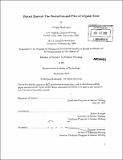Distant harvest : the production and price of organic food
Author(s)
Sherburne, Morgan (Morgan L.)
DownloadFull printable version (2.463Mb)
Alternative title
Production and price of organic food
Other Contributors
Massachusetts Institute of Technology. Graduate Program in Science Writing.
Advisor
Robert Kanigel.
Terms of use
Metadata
Show full item recordAbstract
Organic food is growing in popularity, enjoying a 15 to 20% increase in sales, yearly, since about 1997, according to the Organic Trade Association. Organic produce makes up about 2% of the United States' total food sales - and because it doesn't rely on synthetic pesticides or herbicides, some view it as more environmentally friendly than its conventionally grown counterpart. But it's a complicated way to farm. A truly organic method of farming, according to Sir Albert Howard, the British grandfather of organic methods, uses crop rotation, compost as fertilizers, and grows a plethora of produce. Organic produce is expensive to grow in this way, and it hits consumer pocketbooks with a wallop. Produce from large-scale organic farms is less expensive, but those large-scale farms do not challenge the way food has been grown, says University of California - Santa Cruz professor Julie Guthman. They grow in monocultures, like conventional farms, and use large amounts of organic fertilizer and pesticides. They also take advantage of migrant labor. And after this, customers can expect to pay up to 50% more for an organic diet compared to a conventional one, according to Consumer Reports. If we eventually switch over to a more sustainable way of growing our food, we could, says MIT agricultural historian Deborah Fitzgerald, experience the gentrification of our food system.
Description
Thesis (S.M. in Science Writing)--Massachusetts Institute of Technology, Dept. of Humanities, Graduate Program in Science Writing, 2010. "September 2010." Cataloged from PDF version of thesis. Includes bibliographical references (p. 35-37).
Date issued
2010Department
Massachusetts Institute of Technology. Graduate Program in Science Writing; MIT Program in Writing & Humanistic StudiesPublisher
Massachusetts Institute of Technology
Keywords
Graduate Program in Science Writing.